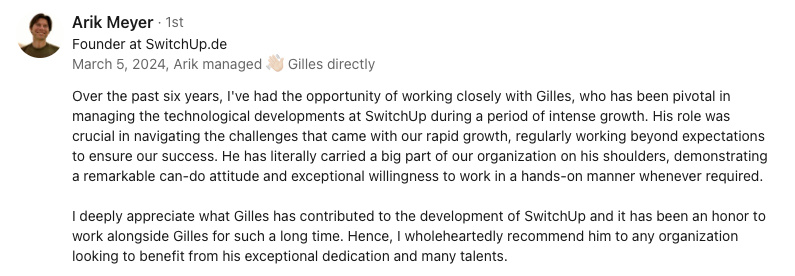Abstract:
The article discusses the importance of data protection for startups, emphasizing compliance with the General Data Protection Regulation (GDPR) as a means to build trust and differentiate their brand. Virtual Private Networks (VPNs) are highlighted as valuable tools for achieving GDPR compliance due to their encryption capabilities, which secure data and enhance privacy. The article outlines how VPNs contribute to data protection through anonymization, secure tunneling, and kill switches, bolstering a startup's efficiency and trustworthiness. It also explores how transparency in privacy policies and third-party certifications can enhance brand credibility. Additionally, the article recommends using VPNs to secure partnerships and facilitate global market access, while also fostering a culture of privacy within organizations through training and policy integration. Case studies, such as those from Proton Technologies and NordVPN, exemplify successful VPN integration, showcasing their role in enhancing trust and security. Overall, the strategic use of VPNs is presented as a key factor in ensuring data privacy, compliance, and competitive advantage for startups.
Navigating data protection can be challenging, especially for those leading new businesses. Startups must ensure compliance with the General Data Protection Regulation (GDPR) not just to adhere to the law, but to build trust. Virtual Private Networks (VPNs) are valuable tools in this regard. They offer strong encryption and privacy features that can help position your startup as trustworthy. Let's explore how VPNs can secure data and enhance efficiency and brand image.
Strategic Compliance with GDPR
European startups must comply with GDPR, and VPNs are a useful tool for this, offering features that secure data and improve efficiency.
VPN Features for GDPR Compliance
Encryption's Role in GDPR ComplianceEncryption is essential for GDPR compliance, acting like a shield to secure data. VPNs use strong protocols like AES-256 to keep data private, making it unreadable to outsiders. This is crucial for protecting personal information from being intercepted. From my experience in IT, encryption is often the first step in data protection, crucial for startups aiming to meet regulations. For instance, during a project at my previous company, implementing encryption protocols significantly reduced data breach incidents.
Anonymizing Data to Minimize ExposureVPNs also help by anonymizing data, reducing its exposure and aligning with GDPR's minimization principle. By hiding a user's IP address and providing a new one, VPNs keep online activities private. This not only meets GDPR rules but also demonstrates a company’s dedication to privacy.
Importance of Secure Tunneling and Kill SwitchesSecure tunneling and kill switches are vital for preventing data breaches. VPNs use protocols like OpenVPN to create secure data channels. A kill switch disconnects the internet if the VPN drops, preventing data leaks. Key features include:
- Secure Tunneling Protocols: OpenVPN, IKEv2/IPsec
- Kill Switch: Cuts internet if VPN fails
Consider how startups like Proton Technologies have integrated these features, enhancing trust and compliance.
Building Trust and Differentiation with VPNs
In the startup world, using VPNs can be a strategic advantage for trust and brand differentiation. Marketing data privacy effectively helps position your company as a trustworthy leader.
Marketing Data Privacy Commitment
Enhancing Transparency Through Privacy PoliciesTransparency builds trust, and privacy policies are vital here. Startups should clearly show how VPNs fit into their data protection strategies. People value companies that are clear about data use. Transparent privacy practices can strengthen brand loyalty.
Leveraging Third-Party Certifications for CredibilityThird-party certifications validate a company's data security efforts. Certifications like ISO/IEC 27001 show consumers that security measures meet international standards. Startups can leverage these certifications by prominently displaying them on their websites and marketing materials, boosting credibility.
Positioning as a Privacy Authority Through Customer EducationEducating customers on data privacy positions a startup as a trusted authority. Creating content explaining VPNs and data protection empowers customers and builds a strong brand narrative around privacy. This can include guides, webinars, and blog updates.
Communicating Privacy Practices Effectively
Effective privacy communication nurtures trust and shows commitment to protecting data.
Crafting Clear and Accessible Privacy Policies
Privacy policies should be clear and easy to find. Simple language makes them understandable, encouraging engagement. Clear communication turns complex documents into guides that promote trust.
Utilizing Visual and Interactive Elements
Visuals and interactive elements enhance engagement. Infographics or videos can make privacy information more digestible and engaging. These tools show an innovative approach to consumer education.
Empowering Users with Control and Consent Mechanisms
Allowing users to control their data preferences builds trust. Effective consent mechanisms involve consumers in privacy processes. Examples include:
- Granular Privacy Settings: Users specify data collection preferences
- Interactive Consent Forms: Clear terms in an easy format
These strategies ensure transparency and foster a collaborative relationship.
VPNs as Enablers of Secure Partnerships
Collaborating with vendors and partners is essential but risky for data privacy. VPNs help secure these partnerships by enabling safe data sharing.
Securing Data Sharing with Third Parties
The Role of Data Encryption in Secure Data SharingData encryption ensures secure sharing with partners. VPNs use strong protocols to protect data during transmission. This builds trust and compliance frameworks in collaborations. However, integrating VPNs with other technologies like SDN and cloud services can present challenges. A startup I consulted for successfully overcame these by selecting compatible technologies and thorough testing.
Enabling Secure Remote Access for Vendors and PartnersVPNs provide secure remote access for partners needing data exchange. This reduces risks and simplifies onboarding, facilitating collaboration across borders.
Compliance Benefits of VPNs in Data SharingVPNs offer compliance advantages, supporting data protection regulations by:
- Encrypting data
- Restricting access
- Monitoring for compliance
These measures meet regulations and build partner confidence.
Setting Up Seamless and Secure VPN Collaborations
Assessing Needs and Objectives Before ImplementationBefore using a VPN, assess needs and goals. This guides VPN choice and ensures it aligns with business aims. Consider:
- Use Cases: Remote access or secure sharing?
- Scalability: Can it grow with the business?
Select the VPN type based on needs:
- Remote Access VPNs: For individual access
- Site-to-Site VPNs: Connects networks
- Cloud VPNs: Links on-premises and cloud
The choice should reflect connectivity and security priorities.
Selecting a Reliable VPN Provider with Strong Security FeaturesA trusted provider offers robust security, including:
- Advanced Encryption
- No-Log Policies
- Strong Authentication Methods
Choosing a secure provider makes a big difference in building trustworthy partnerships.
Creating a Culture of Privacy First
Fostering a privacy culture in startups is crucial, with VPNs playing a key role. By integrating VPNs into daily operations, startups can build trust and compliance.
Training Teams on Privacy and VPN Use
Training on privacy regulations and VPN use is essential. Sessions can help employees understand the legal landscape and how VPNs protect data. Compliance is about embedding privacy into the company ethos.
- Initial Training: Intro to privacy and VPNs
- Hands-On Workshops: Practical VPN setup and use
- Regular Refreshers: Updates on privacy changes
Integrating VPNs into IT policies strengthens security culture, ensuring consistent use.
Fostering a Culture of Privacy
Leadership must prioritize privacy, setting a tone of accountability. Regular updates keep privacy a core business value. Keeping VPNs updated maintains strong defenses. Feedback loops let employees suggest improvements, ensuring privacy practices evolve. I recall a time when a small change suggested by a team member significantly improved our data protection strategy.
Case Studies and Practical Insights
Real-World Case Studies of VPN Integration
Proton Technologies' Path to Enhanced Trust
Proton Technologies, known for secure email services, expanded into VPNs, focusing on privacy. They don’t log data and use strong encryption, meeting GDPR standards. This approach builds trust and compliance.
NordVPN and Secure Third-Party Collaborations
NordVPN in Lithuania uses robust data protection for secure third-party collaborations. Their strong security measures meet GDPR, enhancing their competitive position and trustworthiness.
Actionable Advice for Leveraging VPNs
Enhancing Data Security and Privacy
Startups can use VPNs to secure data and meet regulations like GDPR. Choose a provider with strong encryption and no-log policies to protect information. For example, a startup successfully integrated VPNs with cloud services, achieving both security and operational efficiency.
Facilitating Global Market Access
VPNs help startups access global markets by bypassing restrictions and supporting remote work. This expands reach and operational flexibility.
VPNs for Competitive Intelligence and Network Performance
Use VPNs for security and market insights. They also improve network performance and reliability, supporting growth and competition.
Embracing VPNs is about more than GDPR—it’s a strategic move to build trust and differentiate your startup. With strong encryption, data protection, and clear privacy practices, VPNs boost consumer confidence and efficiency. How is your startup ensuring data privacy and compliance? Feel free to share your experiences.
You might be interested by these articles:
- Next-Gen Secure SD-WAN Solutions
- SD-WAN Implementation Best Practices
- Maximizing VPN Efficiency in Modern Networks
See also:
- Gilles Crofils: Skills, Industries and Markets
- Advancing with Optical Fiber Innovations
- Chief Technical Officer Salary Career Development
- Green Futures in Business Ethics
- Kotlin Multiplatform: Revolutionizing App Development
- Boosting Office Morale with Mental Health Apps
- Blending Realities for Enhanced Workflows





